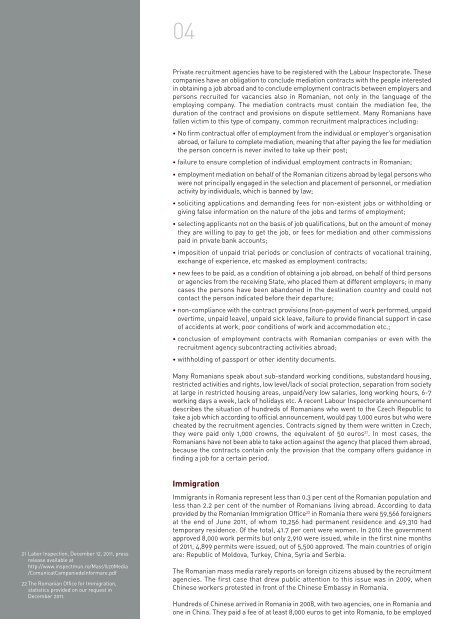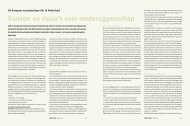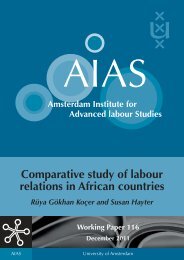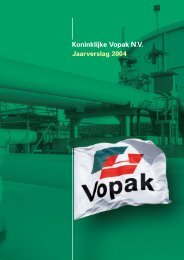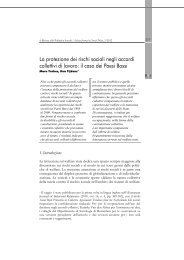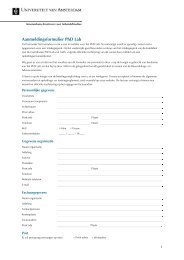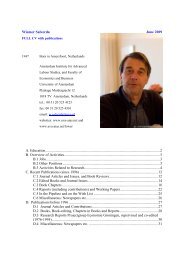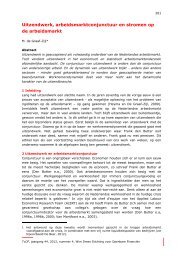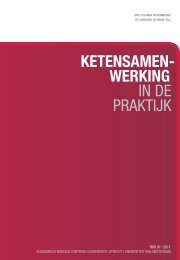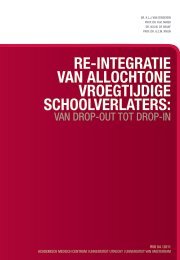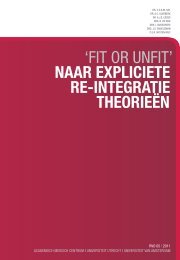04Private recruitment agencies have to be registered with the Labour Inspectorate. Thesecompanies have an obligation to conclude mediation contracts with the people interestedin obtaining a job abroad and to conclude employment contracts between employers andpersons recruited for vacancies also in <strong>Romania</strong>n, not only in the language of theemploying company. The mediation contracts must contain the mediation fee, theduration of the contract and provisions on dispute settlement. Many <strong>Romania</strong>ns havefallen victim to this type of company, common recruitment malpractices including:• No firm contractual offer of employment from the individual or employer’s organisationabroad, or failure to complete mediation, meaning that after paying the fee for mediationthe person concern is never invited to take up their post;• failure to ensure completion of individual employment contracts in <strong>Romania</strong>n;• employment mediation on behalf of the <strong>Romania</strong>n citizens abroad by legal persons whowere not principally engaged in the selection and placement of personnel, or mediationactivity by individuals, which is banned by law;• soliciting applications and demanding fees for non-existent jobs or withholding orgiving false information on the nature of the jobs and terms of employment;• selecting applicants not on the basis of job qualifications, but on the amount of moneythey are willing to pay to get the job, or fees for mediation and other commissionspaid in private bank accounts;• imposition of unpaid trial periods or conclusion of contracts of vocational training,exchange of experience, etc masked as employment contracts;• new fees to be paid, as a condition of obtaining a job abroad, on behalf of third personsor agencies from the receiving State, who placed them at different employers; in manycases the persons have been abandoned in the destination country and could notcontact the person indicated before their departure;• non-compliance with the contract provisions (non-payment of work performed, unpaidovertime, unpaid leave), unpaid sick leave, failure to provide financial support in caseof accidents at work, poor conditions of work and accommodation etc.;• conclusion of employment contracts with <strong>Romania</strong>n companies or even with therecruitment agency subcontracting activities abroad;• withholding of passport or other identity documents.Many <strong>Romania</strong>ns speak about sub-standard working conditions, substandard housing,restricted activities and rights, low level/lack of social protection, separation from societyat large in restricted housing areas, unpaid/very low salaries, long working hours, 6-7working days a week, lack of holidays etc. A recent Labour Inspectorate announcementdescribes the situation of hundreds of <strong>Romania</strong>ns who went to the Czech Republic totake a job which according to official announcement, would pay 1,000 euros but who werecheated by the recruitment agencies. Contracts signed by them were written in Czech,they were paid only 1,000 crowns, the equivalent of 50 euros 21 . In most cases, the<strong>Romania</strong>ns have not been able to take action against the agency that placed them abroad,because the contracts contain only the provision that the company offers guidance infinding a job for a certain period.21 Labor Inspection, December 12, 2011, pressrelease available athttp://www.inspectmun.ro/Mass%20Media/ComunicatCampaniedeInformare.pdf22 The <strong>Romania</strong>n Office for Immigration,statistics provided on our request inDecember 2011.ImmigrationImmigrants in <strong>Romania</strong> represent less than 0.3 per cent of the <strong>Romania</strong>n population andless than 2.2 per cent of the number of <strong>Romania</strong>ns living abroad. According to dataprovided by the <strong>Romania</strong>n Immigration Office 22 in <strong>Romania</strong> there were 59,566 foreignersat the end of June 2011, of whom 10,256 had permanent residence and 49,310 hadtemporary residence. Of the total, 41.7 per cent were women. In 2010 the governmentapproved 8,000 work permits but only 2,910 were issued, while in the first nine monthsof 2011, 4,899 permits were issued, out of 5,500 approved. The main countries of originare: Republic of Moldova, Turkey, China, Syria and Serbia.The <strong>Romania</strong>n mass media rarely reports on foreign citizens abused by the recruitmentagencies. The first case that drew public attention to this issue was in 2009, whenChinese workers protested in front of the Chinese Embassy in <strong>Romania</strong>.Hundreds of Chinese arrived in <strong>Romania</strong> in 2008, with two agencies, one in <strong>Romania</strong> andone in China. They paid a fee of at least 8,000 euros to get into <strong>Romania</strong>, to be employed
05in the construction industry on a salary of at least 800 euros per month. But they receivedonly 100 lei a month for food, were provided with accommodation, and the rest of themoney was supposed to be paid directly to families in China, as they were being employedby a company in China and posted in <strong>Romania</strong>. Six months later they were dismissed, dueto the economic crisis in the construction sector.According to the Chinese embassy, the workers came to <strong>Romania</strong> to work legally or ona temporary permit, but for many of them the formalities were not completed. Promisesby the agencies or the companies employing them were not always respected, and theChinese workers found themselves being paid far less than had been agreed.“The posted workers do nothave any protection in relationto: minimum wages; workingtime and other workingconditions; statutory socialsecurity benefits; access totraining; occupational safetyand health; compensation incases of occupational accidentsand diseases and insolvencyand protection of workers’claims.”The report ‘Social and Labour Issues Concerning Migrant Workers in the ConstructionIndustry’, published in 1995 by the International Labour Office in Geneva shows that inChina ‘it is common to find firms operating as “labour contractors”, supplying constructionlabour services to overseas construction firms. Such firms not only recruit labour but alsoassume direct responsibility for the wages and welfare of the workers. They thereforeresemble “labour-only subcontractors” except that they are not responsible for outputs.’It seems this was the case for the Chinese workers in the construction industry who wereprovided in <strong>Romania</strong> with a contract not signed by the employer, which had no identificationdata for the employer and contained an illegal clause saying that: ‘I acknowledge that if Ileave the employer without notice I will be liable to pay a fine of 10,000 euros to the<strong>Romania</strong>n immigration authorities’. Many workers complained about the lack oftransparency surrounding the terms of the contract and said that the recruitment agenciesmade them promises which were not observed by the employers, once in <strong>Romania</strong>. Theworkers were promised employment contracts for four or five years, but the work permitis issued on an annual basis, and, if they lose their job and don’t find another employer in30 days, they must leave <strong>Romania</strong>. Most of the workers were not aware of what type ofwork visa they had (in their case, of posted workers). They didn’t speak the <strong>Romania</strong>nlanguage and they were not informed about which public institution they could address.Other situations are described by the foreign workers. A construction company in Iaşisigned employment contracts for 1,000 lei instead of 1,000 dollars. In the case of the 300Chinese women working in Bacau, in the textile industry, their contract with therecruitment agency stipulated that they had to pay up to 4,000 dollars in order to beselected to work in the company. The workers had to transfer 25 per cent of their salaryevery month to repay this amount. At the time of their recruitment the workers werepromised wages of 700 dollars per month. In fact they only received 300 dollars per month.Additional deductions were made for food and accommodation. The workers complainedabout the unrealistic workload and the sub-standard accommodation, in an industrialbuilding in small makeshift rooms that had no ceiling, sleeping nine to a room. They weretotally isolated by their <strong>Romania</strong>n co-workers and by the local population.Workers also say it is difficult to understand the contents of their contract, especiallybecause <strong>Romania</strong>n law specifically indicates that employment contracts must be signedin the <strong>Romania</strong>n language. This is, again, an opportunity for abuse by unscrupulousrecruitment agencies, which are using two versions of the same contract, in differentlanguage and containing different clauses. In addition the immigrant workers are deniedfundamental rights such as freedom of association, collective bargaining, equality ofopportunity and treatment. The posted workers do not have any protection in relation to:minimum wages; working time and other working conditions; statutory social securitybenefits; access to training; occupational safety and health; compensation in cases ofoccupational accidents and diseases and insolvency and protection of workers’ claims.A special category of private recruitment agencies has begun to develop in <strong>Romania</strong> inthe last few years: baby sitters’, nannies’ and maids’ placement agencies. Thesespecialised companies bring nannies from the Philippines or, more recently, fromThailand, Nepal, and Bangladesh. The commissions paid by the employer range from500 euros (when the recruitment agency provides only certain services) and 4,500 euros(the recruitment agency is fully in charge of placing the employee), includedocumentation, the medical check-up, airline tickets and the recruitment agency’s fees.In spite of the economic crisis, in the last two to three years it became fashionable forfamilies with incomes of about 2,000 euros, people working in middle and topmanagement, including ex-pats, politicians and showbiz people to engage foreignnannies, with demand increasing by 70 per cent in 2011 alone. Some of them are livinga nightmare once in <strong>Romania</strong>. Their experiences are terrifying and only a few agreed tobe interviewed, on condition of anonymity. Their names have therefore been changed 23 .23 The interviews with the Filipino workers,as well as with the representatives of thebaby sitter, nannies, and maids’ placementagencies have been realized by LauraŞtefănuţ.


